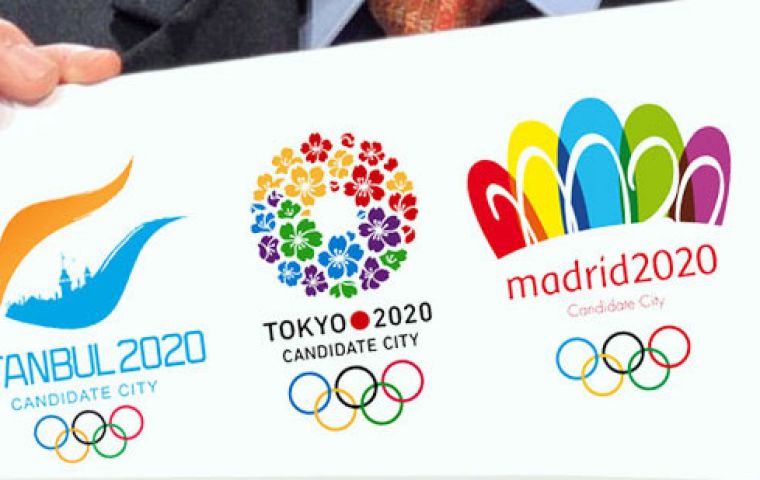MercoPress. South Atlantic News Agency
Final presentation from three PMs to decide what city will host 2020 Olympics
 Shinzo Abe of Japan, Mariano Rajoy of Spain and Recep Tayyip Erdogan of Turkey will be in Buenos Aires on Saturday
Shinzo Abe of Japan, Mariano Rajoy of Spain and Recep Tayyip Erdogan of Turkey will be in Buenos Aires on Saturday From the Fukushima nuclear leak to the war in Syria to Europe's economic crisis, the choice of the host city for the 2020 Olympics is fraught with risks. Picking the site with the least risks shapes up as the challenge for the International Olympic Committee on Saturday in a tight three-city contest that members say is too close to call.
After a two-year global race, Tokyo, Madrid and Istanbul spent their final full day of campaigning Friday to drum up last-minute support in their bid to secure the biggest sports event on the international stage.
Tokyo has been seen as a slight favourite, but its status has been put into question by concerns over the leak of radioactive water from the crippled Fukushima plant.
Madrid, once counted out because of Spain's financial troubles, has generated the most recent buzz and momentum and could be poised for an upset win.
Istanbul, dogged by the war in neighbouring Syria and possible Western military strikes against Bashar Assad's regime, looks to be the outsider.
London bookmakers have been taking a rush of bets on Madrid, whose odds have been slashed from 4-1 a week ago to 5-4. Tokyo remains the betting favourite, though its odds have shortened to 5-6. Istanbul is listed at 6-1.
“There are all kinds of predictions, all kinds of bets but the only one numbers that matter are the ones from the votes on Saturday afternoon,” Madrid Mayor Ana Botella said.
IOC elections are extremely unpredictable as members vote by secret ballot and take different personal reasons into account. Some members are still undecided and will be waiting for the final 45-minute presentations on Saturday before making up their mind.
Leading the delegations will be the prime ministers of all three countries. Shinzo Abe of Japan, Mariano Rajoy of Spain and Recep Tayyip Erdogan of Turkey were all flying to Buenos Aires straight from the G20 summit in St. Petersburg, Russia.
If all IOC members are in attendance, 97 will be eligible to vote in the first round. With a majority required for victory, the process is likely to go two rounds. The city with the fewest votes is eliminated after the first round, setting up a final head-to-head ballot. Outgoing IOC President Jacques Rogge will open a sealed envelope to announce the winner.
All three are repeat bidders: Istanbul for a fifth time overall, Madrid for a third straight and Tokyo a second in a row.
Previous bid campaigns have been marked by overriding geographic or emotional factors. In 2009, the IOC awarded the 2016 Olympics to Rio de Janeiro because of the Brazilian city's push to take the games to South America for the first time.
There has been no feel-good theme this time as the campaign has been dominated by the negatives surrounding each bid: Syria, doping scandals and anti-government protests in Turkey; severe recession and 27% unemployment in Spain; and, most recently, the Fukushima leak in Japan.
Many members also will be voting with Rio in mind. The Brazilian city has been plagued by construction delays and other issues in its preparations for 2016, leaving members in search of a safe, reliable host for 2020.
Tokyo has championed itself as the “safe pair of hands” but has been on the defensive this week because of Fukushima. Some IOC members are looking for Abe to deal with the issue directly in Saturday's presentation.
On Friday, Tokyo organizers gave the clearest response so far of the leak.
Hiroshi Hase, a former Olympic wrestler and member of the Japanese parliament, minimized the problem with a detailed presentation -- a strategy that has been lacking for several days as Japanese officials struggled with the subject.
“There is a very limited area where contaminated water is leaking out in the port. ... But we will monitor it, remove it and contain it. That is the gist of the strategy,” Hase said.
Madrid has gained the most ground in recent months, weeks and days. The turnaround started at the bid city technical presentations in Lausanne, Switzerland, in July, where the Spaniards pressed their case that they offer the safest financial option: 80% of the venues ready and only 1.9 billion needed for construction.
Madrid also has a star performer in Crown Prince Felipe, a former Olympic sailor and Spain's flag-bearer at the 1992 Barcelona Games. He wowed the members in his speech in July and will be Madrid's featured speaker in Saturday's presentation.
But in Buenos Aires on Saturday, the some 100 members of the International Olympic Committee must choose the least bad option and trust the winning city can deliver on their promises




Top Comments
Disclaimer & comment rules-

-

-

Read all commentsWhat a joke, Spain can't afford these games. I would vote for Tokyo.
Sep 07th, 2013 - 02:26 am 0No doubt Spain will find some way to get the EU Fisheries Fund to pay for it.
Sep 07th, 2013 - 03:24 am 0I'd love to be a fly in the wall when Spain approaches Britain for support for their bid.
Sep 07th, 2013 - 06:58 am 0I wonder if they will be disappointed?
Commenting for this story is now closed.
If you have a Facebook account, become a fan and comment on our Facebook Page!